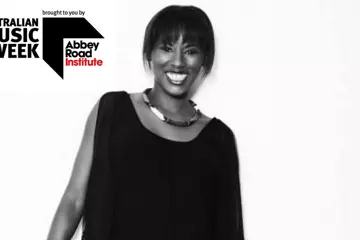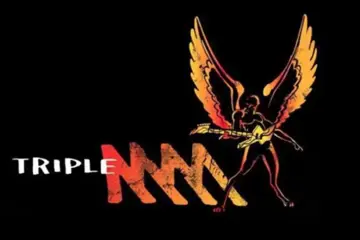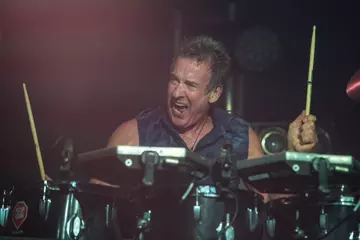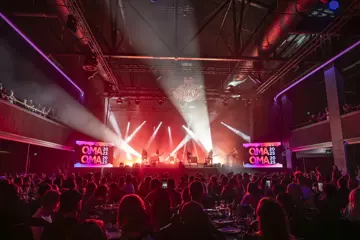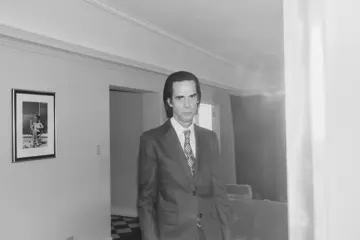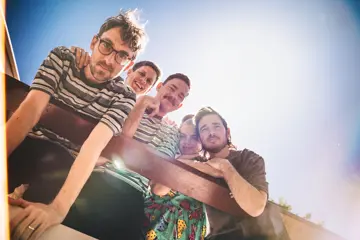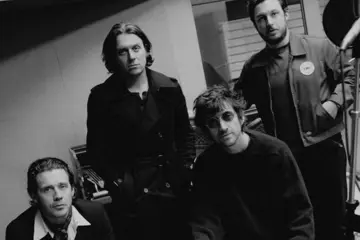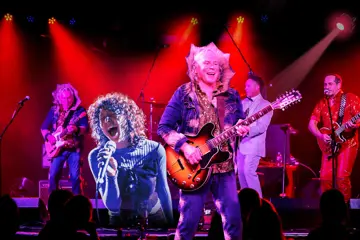There's a term that, for all its negative connotations – those potentially of self-importance, of fret-wankery and the like – is actually more innocuously endearing. The term is a 'musicians' band', a term that acknowledges that for all the praise, accolades and respect heaped on a band by their fellow musicians and industry types for all their undisputed skill, mainstream success – entirely deserved in the eyes of those mentioned above – remains illusive.
Suggest to Matt Blackman that Charge Group are one such band and it's clear the thought's already entered his head and those of his bandmates – drummer Matt Rosetti, bassist Adam Jesson and violinist/vocalist Jason Tampake – and contributed to the extended delay between the release of their debut, 2008's Escaping Mankind, and the self-titled album they released earlier this year.
“We've always operated this band at a relatively slow pace for a number of different reasons,” Blackman explains. “One is just being aware of the size of the market in Australia for people who like the kind of music that we play – it's certainly not avant-garde, but it's certainly not music for everyone at the same time. Compared to places like Europe and America where bands that are taking a few chances creatively can happily make a living, it's not really that feasible without burning yourself out just touring all the time to play that sort of music in Australia.
“It's probably a reflection of the industry though. It's an industry that tends to spoon-feed people with, a lot of the time, pretty bad representations of what bands are and what new music is, and I think it's just coming to terms with that and saying, 'How are we going to work within these parameters?' And we've just found over the years that it's good to just spread our energies fairly wide and do good tours and good releases where we can rather than just trying to be another one of those bands that drive themselves into the ground. You could possibly get away with that – and a lot of bands do in America or Europe – but it's a bit harder here and I think we've chosen to take things slowly as a means of being more practical. We just enjoy what we do so much that we don't want to become…” he trails off here in search perhaps of the worst case scenario, “I don't know… We don't want to take our music or our friendship for granted, you know?”
Don't miss a beat with our FREE daily newsletter
The band certainly has been spreading its energies wide. Between Charge Group releases Jesson and Rosetti spent time in Newcastle guitar rock outfit The Instant, Blackman co-formed Palace Of Fire (whose first show was with Battles, at the Opera House) with ex-Wolfmother men Chris Ross and Myles Heskett, while occasionally sitting behind the drums in Tucker B's and contributing to indie act Firekites, which Tampake also did between his work as touring violinist for Josh Pyke's band.
Eventually, however, the time was right for Charge Group yet again. They hired out the Christian Science Church in Hamilton, Newcastle, where Blackman's parents are weekly attendees, and committed themselves once again to Charge Group's expansive musical vision. “It's a bit hard to do them both at the same time with the same level of energy without diluting one or the other,” Blackman says of balancing projects, “I'm not really sure if there's any point doing anything half-arsed I reckon.”
Half-arsed it was not. With other projects on the back burner the band relocated into the church and knuckled down to completing the stunning ponymous album. “It's a church my parents go to, so we took it to a board meeting and we just gave them a token amount and took over the church for a couple of weeks. We had to move out come Saturday nights ready for the Sunday morning service and then load back in on Sunday afternoon and set everything back up again,” Blackman says with a laugh. “It was awesome, it was such a good way to do it.”
Clearly their selection of recording environment was not one based on ease of access, but for Blackman, who co-produced and recorded the majority of the album (bar a few bits and pieces recorded by Wayne Connolly at Albert's studio in Neutral Bay and Bobby Lurie at Mavericks in New York City), there was something about the acoustics the church provided that was perfectly in sync with their vision for Charge Group. “The main purpose was to just find a good acoustic space where we could just have a nice natural drum sound, and then everything else just sort of fell around that. The acoustic space really affects the mood of the recording for me, especially when I think it's really key to building that good drum sound, which ends up being the foundation for the whole thing. If you don't have a good drum sound you don't have anywhere to go from an engineering perspective.
“From a performance perspective we're doing all these big, singalong moments – of which there's a few on the record – and standing in the same room singing together in this space, you just hear the sound take off in the room. That's the cool thing about churches; they're built to carry acoustics in a certain way. It just has this soaring, magical quality when you're in a nice big room like that.
“A lot of the songwriting concepts came from that recording process as well. There's a few songs that we really did flesh out and write a good portion of there and then in the studio. Run and Gold Is Gone are good examples of the songs that were only sort of half-finished by the time we started recording them and then the space informed how they were finished.”
Not quite biting the hand that feeds, but admirably refusing to be spoon-fed, Charge Group head out on the road once again this month for their second tour in support of the self-titled effort before once again heading to Europe where, one would hope, they won't be taken for granted as they too-often seem to be in their home country. “Here it's more, 'Chuck your guitar over there, soundcheck's in ten minutes and then you're on your own buddy.' That's the way most places deal with touring bands, whereas in Europe the way artists are esteemed and the way they're held in the community is quite different to here, which is really refreshing and quite humbling,” says Blackman, equal parts resigned and resilient.

